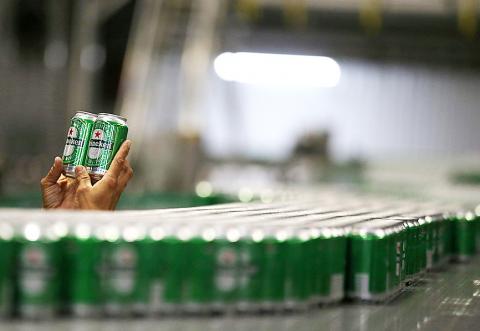Dutch brewer Heineken NV is buying a US$3.1 billion stake in China’s largest beer maker that will allow it to expand in a lager market that is dominated by local brands.
The Amsterdam-based company, which is making a global push into emerging beer markets, is to pay HK$24.4 billion for a 40 percent stake in the parent of China Resources Beer Holdings Co (華潤啤酒控股), maker of China’s best-selling Snow beer brand.
The deal will help Heineken gain a tighter foothold in a crowded field by leveraging China Resources Beer’s extensive distribution network, while also sharing in the returns of China’s beer market leader.

Photo: Reuters
China is now the second-largest premium beer market globally and is forecast to be the biggest contributor to premium volume growth in the next five years, Heineken said in its statement yesterday.
Heineken is paying an implied price of HK$36.31 a share of the listed entity, a 2.4 percent premium over its closing price on Thursday.
Under the deal, Heineken’s operations in China will be combined with those of China Resources Beer, and the Dutch brewer will license its brand to the Chinese partner on a long-term basis, according to company statements.
China Resources Beer’s parent company will acquire Heineken shares worth about 464 million euros (US$538 million).
Heineken will also make its global distribution channels available to China Resources’ brands, including Snow, according to the statement.
“It’s impossible that Heineken can grab a significant larger market share in China by itself,” Guotai Junan Securities Co (國泰君安證券) analyst Barney Wu (吳宇揚) said. “It has missed the chance as other international rivals such as AB InBev have become strong market leaders in the market.”
China has proved to be a difficult environment for some foreign operators in recent years. Asahi Group Holdings Ltd exited after selling its minority stake in Tsingtao Brewery Co (青島啤酒) and another in a Chinese beverage joint venture last year as it focused on acquisitions in Europe.
Heineken’s overseas expansion, namely in Brazil, has squeezed its profits.
The market is dominated by local companies, with three Chinese brewers accounting for more than half of total volume, according to Euromonitor International.
While China Resources dominates with a 26 percent share, Heineken’s brand commands less than 1 percent of the market.
“I’m surprised China Resources is willing to sacrifice so much of its shares to get Heineken,” Wu said.
“It shows the market leader in China is quite concerned that its growth potential is largely restricted compared with its competitor AB InBev, as the market is on the track of premiumization,” Wu added.

Taiwanese suppliers to Taiwan Semiconductor Manufacturing Co. (TSMC, 台積電) are expected to follow the contract chipmaker’s step to invest in the US, but their relocation may be seven to eight years away, Minister of Economic Affairs J.W. Kuo (郭智輝) said yesterday. When asked by opposition Chinese Nationalist Party (KMT) Legislator Niu Hsu-ting (牛煦庭) in the legislature about growing concerns that TSMC’s huge investments in the US will prompt its suppliers to follow suit, Kuo said based on the chipmaker’s current limited production volume, it is unlikely to lead its supply chain to go there for now. “Unless TSMC completes its planned six

Intel Corp has named Tasha Chuang (莊蓓瑜) to lead Intel Taiwan in a bid to reinforce relations between the company and its Taiwanese partners. The appointment of Chuang as general manager for Intel Taiwan takes effect on Thursday, the firm said in a statement yesterday. Chuang is to lead her team in Taiwan to pursue product development and sales growth in an effort to reinforce the company’s ties with its partners and clients, Intel said. Chuang was previously in charge of managing Intel’s ties with leading Taiwanese PC brand Asustek Computer Inc (華碩), which included helping Asustek strengthen its global businesses, the company

Power supply and electronic components maker Delta Electronics Inc (台達電) yesterday said second-quarter revenue is expected to surpass the first quarter, which rose 30 percent year-on-year to NT$118.92 billion (US$3.71 billion). Revenue this quarter is likely to grow, as US clients have front-loaded orders ahead of US President Donald Trump’s planned tariffs on Taiwanese goods, Delta chairman Ping Cheng (鄭平) said at an earnings conference in Taipei, referring to the 90-day pause in tariff implementation Trump announced on April 9. While situations in the third and fourth quarters remain unclear, “We will not halt our long-term deployments and do not plan to

The New Taiwan dollar and Taiwanese stocks surged on signs that trade tensions between the world’s top two economies might start easing and as US tech earnings boosted the outlook of the nation’s semiconductor exports. The NT dollar strengthened as much as 3.8 percent versus the US dollar to 30.815, the biggest intraday gain since January 2011, closing at NT$31.064. The benchmark TAIEX jumped 2.73 percent to outperform the region’s equity gauges. Outlook for global trade improved after China said it is assessing possible trade talks with the US, providing a boost for the nation’s currency and shares. As the NT dollar